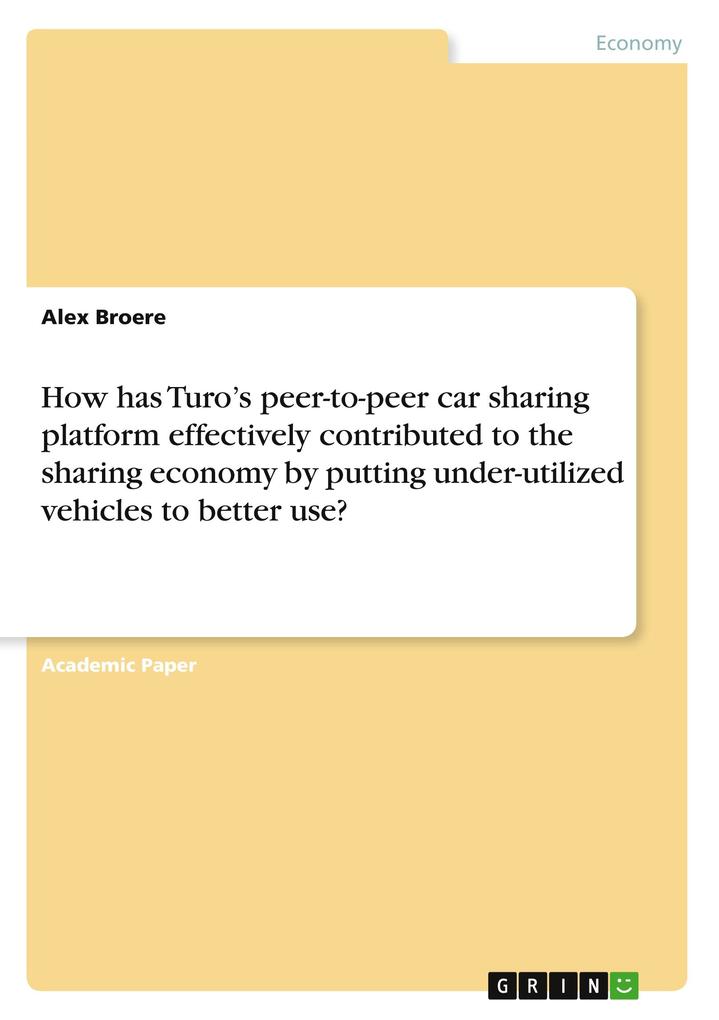
Zustellung: Fr, 16.05. - Di, 20.05.
Versand in 6 Tagen
VersandkostenfreiBestellen & in Filiale abholen:
Academic Paper from the year 2018 in the subject Business economics - Miscellaneous, grade: 7.8, University of Amsterdam, course: Business Administration, language: English, abstract: This paper will attempt to answer the following question: How has Turös peer-to-peer car sharing platform effectively contributed to the sharing economy by putting underutilized vehicles to better use? . The answer to this question will make it clear whether
Turös platform positively contributes to the sharing economy. A literature review will be used to answer this question, which consists of academic articles on peer-to-peer platforms, car sharing and Turös activity in multiple markets. This material is reinforced with data, analytics and reviews from the platform.
Turo, a peer-to-peer platform, enables its users to rent the exact car that is advertised and costing 35% less than traditional agency prices on average. On the other side, it allows car owners to rent out their under-utilized car on the platform. Founded in 2009 in San Francisco, California - Turo has since become active in more than 4500 cities spread across 3 countries and now employs 110 people. The providers on the platform also cover over 300 airports, providing a solid alternative for regular rental car agencies.
Armed with its mission to put the world s one billion cars to better use , the firm generates revenue with every car rental booked through the platform. Even though Turo has not yet reached profitability, it has raised more than $172m in venture capital and acquired two firms to expand its operations internationally. Turo was also named amongst Uber and WeWork in the Forbes 15 hottest on-demand startups of 2015.
Turös platform positively contributes to the sharing economy. A literature review will be used to answer this question, which consists of academic articles on peer-to-peer platforms, car sharing and Turös activity in multiple markets. This material is reinforced with data, analytics and reviews from the platform.
Turo, a peer-to-peer platform, enables its users to rent the exact car that is advertised and costing 35% less than traditional agency prices on average. On the other side, it allows car owners to rent out their under-utilized car on the platform. Founded in 2009 in San Francisco, California - Turo has since become active in more than 4500 cities spread across 3 countries and now employs 110 people. The providers on the platform also cover over 300 airports, providing a solid alternative for regular rental car agencies.
Armed with its mission to put the world s one billion cars to better use , the firm generates revenue with every car rental booked through the platform. Even though Turo has not yet reached profitability, it has raised more than $172m in venture capital and acquired two firms to expand its operations internationally. Turo was also named amongst Uber and WeWork in the Forbes 15 hottest on-demand startups of 2015.
Produktdetails
Erscheinungsdatum
13. Juni 2018
Sprache
englisch
Auflage
1. Auflage
Seitenanzahl
16
Autor/Autorin
Alex Broere
Verlag/Hersteller
Produktart
kartoniert
Gewicht
40 g
Größe (L/B/H)
210/148/2 mm
ISBN
9783668718494
Entdecken Sie mehr
Bewertungen
0 Bewertungen
Es wurden noch keine Bewertungen abgegeben. Schreiben Sie die erste Bewertung zu "How has Turo's peer-to-peer car sharing platform effectively contributed to the sharing economy by putting under-utilized vehicles to better use?" und helfen Sie damit anderen bei der Kaufentscheidung.









